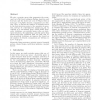Free Online Productivity Tools
i2Speak
i2Symbol
i2OCR
iTex2Img
iWeb2Print
iWeb2Shot
i2Type
iPdf2Split
iPdf2Merge
i2Bopomofo
i2Arabic
i2Style
i2Image
i2PDF
iLatex2Rtf
Sci2ools
117
click to vote
CATS
2007
2007
On the Power of Structural Violations in Priority Queues
We give a priority queue that guarantees the worstcase cost of Θ(1) per minimum finding, insertion, and decrease; and the worst-case cost of Θ(lg n) with at most lg n + O( √ lg n) element comparisons per deletion. Here, n denotes the number of elements stored in the data structure prior to the operation in question, and lg n is a shorthand for max {1, log2 n}. In contrast to a run-relaxed heap, which allows heaporder violations, our priority queue relies on structural violations. By mimicking a priority queue that allows heap-order violations with one that only allows structural violations, we improve the bound on the number of element comparisons per deletion to lg n + O(lg lg n).
| Added | 29 Oct 2010 |
| Updated | 29 Oct 2010 |
| Type | Conference |
| Year | 2007 |
| Where | CATS |
| Authors | Amr Elmasry, Claus Jensen, Jyrki Katajainen |
Comments (0)

